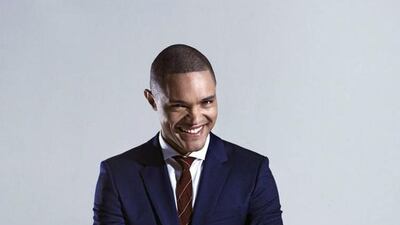Trevor Noah walked onto the stage and bantered with the South African audience, which whooped in appreciation. That was a cue for the next host of Comedy Central's The Daily Show to launch into a slick riff on the absurdity of high-pitched shrieks of delight.
“When did we get to the point where we stopped using words?” Noah mused. Whooping, he said, was “not a natural black sound” because it “sounds eerily similar to a police siren”.
Noah is on a roll, performing sold-out shows in an 1,800-seat Johannesburg theatre ahead of his September 28 Daily Show debut, in a job held by Jon Stewart since 1999. It's a huge leap to the big leagues – or maybe a jump off a cliff – for Noah, a South African who is not widely known in the United States.
That’s just comic grist for Noah, who in his stand-up routine in his home country also makes fun of romantic relationships, obsessive mobile-phone use and even South Africa’s era of white-minority rule.
The big question is whether his brand of humour will translate to the host's chair at the satirical The Daily Show, where Noah has already appeared as a correspondent a handful of times.
Stewart lampoons American politics, media and culture, and international events are also on his menu. Noah, who built a career in South Africa and has toured internationally – he was in Dubai when he learnt he has landed the job to succeed Stewart – looks forward to broadening his appeal.
“I have to become more global,” he said on South Africa’s Radio 702. “I don’t ever dispute that South Africa is my home and that there is news coming from there, but now you have to really go: ‘What is globally newsworthy?’”
It helps that 31-year-old Noah, born to a black, South African mother and a white, Swiss father during apartheid, comes across as a chameleon-like figure with a firm grip on all kinds of accents in his routines.
During a recent show at the Montecasino entertainment complex, he hit some topics that, while they might qualify as low-hanging fruit in a comic context, have universal appeal.
“The older you get, the more you start to realise that you can’t win an argument in a relationship,” he said. “You can’t win a fight with your woman. Because if you lose, you lose. And if you win, you lose.”
Noah will set off for a North American tour – which has yet to sell out – after his five-week run in South Africa, which ends next month.
In Johannesburg, he worked the audience for an hour and 45 minutes without an interval, and without a momentum-breaking lull. Some of his humour was physical – silly walks and gestures and bumbling behaviour that other comics, such as Rowan Atkinson, have used to great effect. Noah’s act was cheerful and generally wholesome, with little sign of the graphic humour noted in some of his past tweets.
Noah was self-deprecating about his new job, casting himself as a new kid on the block, an awkward extra in the glitzy world of superstars. He got a lot of material out of an invitation to the New York Met Gala, where he mixed with Beyoncé, Rihanna and other celebrities he said he had “idolised” for years.
“I don’t know how to let loose when I’m dancing to the music and the people that made the music are watching me,” Noah said of a post-gala party. “I’ve never felt so much pressure in my life.”
He let rip on subjects that anger a lot of South Africans, including persistent electricity cuts and a scandal over state spending on the private home of president Jacob Zuma.
In the South African parliament last week, an opposition lawmaker who was angry about the scandal complained that ruling party members in the chamber laugh “as if we’re in some Trevor Noah show”.
Some South Africans say Noah’s success will elevate their country’s image abroad. In the Radio 702 interview, Noah said he was heading into uncharted waters with his new TV role.
“I’m not even ready for what people will say about me,” he said. The key, he said, is to “just keep doing your thing”.
artslife@thenational.ae

